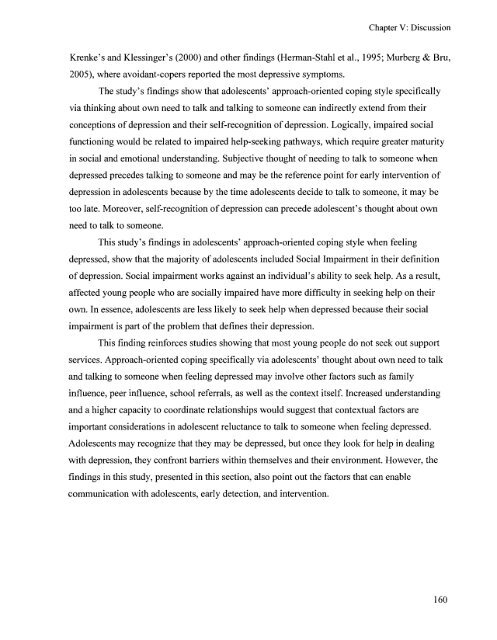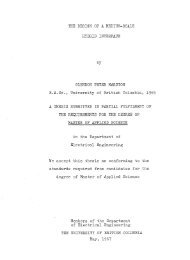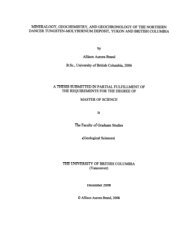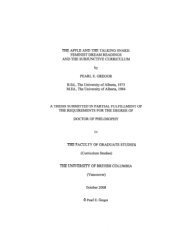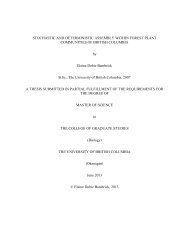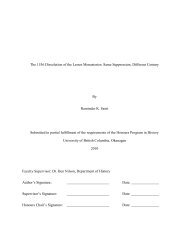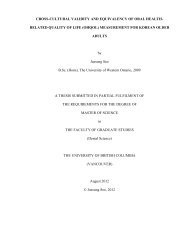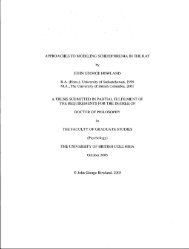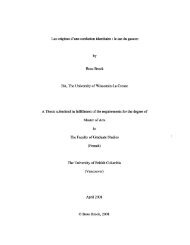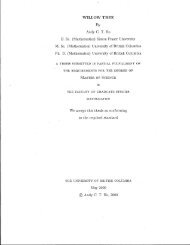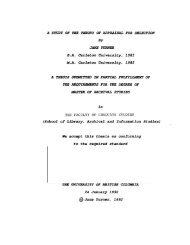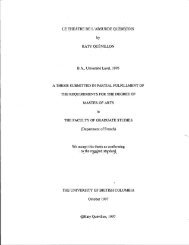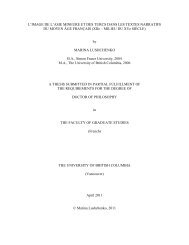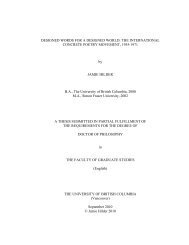how do adolescents define depression? - cIRcle - University of ...
how do adolescents define depression? - cIRcle - University of ...
how do adolescents define depression? - cIRcle - University of ...
You also want an ePaper? Increase the reach of your titles
YUMPU automatically turns print PDFs into web optimized ePapers that Google loves.
Chapter V: Discussion<br />
Krenke's and Klessinger's (2000) and other findings (Herman-Stahl et al., 1995; Murberg & Bru,<br />
2005), where avoidant-copers reported the most depressive symptoms.<br />
The study's findings s<strong>how</strong> that a<strong>do</strong>lescents' approach-oriented coping style specifically<br />
via thinking about own need to talk and talking to someone can indirectly extend from their<br />
conceptions <strong>of</strong> <strong>depression</strong> and their self-recognition <strong>of</strong> <strong>depression</strong>. Logically, impaired social<br />
functioning would be related to impaired help-seeking pathways, which require greater maturity<br />
in social and emotional understanding. Subjective thought <strong>of</strong> needing to talk to someone when<br />
depressed precedes talking to someone and may be the reference point for early intervention <strong>of</strong><br />
<strong>depression</strong> in a<strong>do</strong>lescents because by the time a<strong>do</strong>lescents decide to talk to someone, it may be<br />
too late. Moreover, self-recognition <strong>of</strong> <strong>depression</strong> can precede a<strong>do</strong>lescent's thought about own<br />
need to talk to someone.<br />
This study's findings in a<strong>do</strong>lescents' approach-oriented coping style when feeling<br />
depressed, s<strong>how</strong> that the majority <strong>of</strong> a<strong>do</strong>lescents included Social Impairment in their definition<br />
<strong>of</strong> <strong>depression</strong>. Social impairment works against an individual's ability to seek help. As a result,<br />
affected young people who are socially impaired have more difficulty in seeking help on their<br />
own. In essence, a<strong>do</strong>lescents are less likely to seek help when depressed because their social<br />
impairment is part <strong>of</strong> the problem that <strong>define</strong>s their <strong>depression</strong>.<br />
This finding reinforces studies s<strong>how</strong>ing that most young people <strong>do</strong> not seek out support<br />
services. Approach-oriented coping specifically via a<strong>do</strong>lescents' thought about own need to talk<br />
and talking to someone when feeling depressed may involve other factors such as family<br />
influence, peer influence, school referrals, as well as the context itself. Increased understanding<br />
and a higher capacity to coordinate relationships would suggest that contextual factors are<br />
important considerations in a<strong>do</strong>lescent reluctance to talk to someone when feeling depressed.<br />
A<strong>do</strong>lescents may recognize that they may be depressed, but once they look for help in dealing<br />
with <strong>depression</strong>, they confront barriers within themselves and their environment. However, the<br />
findings in this study, presented in this section, also point out the factors that can enable<br />
communication with a<strong>do</strong>lescents, early detection, and intervention.<br />
160


